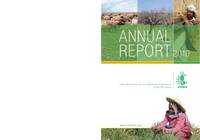ICARDA Annual Report 2010

Authors:
Global food production has increased by 20% in the past decade – but food insecurity and poverty remain widespread , while the natural resource base continues to decline. International research centers, which have helped drive previous improvements, must continue to deliver new technologies to support sustainable growth in agriculture; and to work with other partners to accelerate the dissemination of these technologies.
During 2010, CGIAR Centers and their partners developed a new framework to help achieve these goals. The framework includes a series of multi-disciplinary research programs where different organizations will work closely together, sharing resources and providing complementary skills. These programs will cover dryland agriculture, climate change, water, livestock, crop improvement and other areas. ICARDA will lead the CGIAR Research Program on dryland systems; and play a key role in the programs on wheat, grain legumes, dryland cereals, water, livestock, climate change, and policies, institutions and markets.
Farming conditions in 2010 were difficult, particularly in dryland environments: drought, new disease epidemics, and continued food insecurity for the poorest households. But research results were encouraging, suggesting that these challenges can be gradually overcome. Twenty five new crop varieties, developed from ICARDA germplasm, were released for cultivation in eleven countries. Low-cost methods to increase water productivity were refined. Conservation agriculture techniques were scaled out across more than 27,000 hectares in West Asia. New tools (biotechnology, GIS, simulation models) were successfully applied to supplement conventional methods. Market analyses helped identify income opportunities for small-scale farmers. And a number of exciting new research projects were launched, on crop improvement, biodiversity, water and land management, socio-economics and policy and other areas.
Partnership is the key – to mobilizing resources, developing and scaling out new technologies, and strengthening policy and institutional support for agriculture. We are happy to report that these partnerships are flourishing. The President of India visited ICARDA headquarters in November 2010, paving the way for a major expansion of collaborative research in South Asia.
National policy makers, including Ministers of Agriculture from four countries, visited ICARDA to discuss research plans. Key donors announced formal agreements to accelerate technology dissemination, under which ICARDA technologies will be scaled out through donor-funded development projects. A conference initiated by ICARDA led to agreement among 24 countries and 12 international organizations, on an action plan to ensure food security in developing countries despite the threat of climate change.
This report describes some of the successes of 2010. It is not a comprehensive record. Rather, it aims to provide a flavor of how much can be achieved, even in very difficult farming environments, when good science is combined with strong partnerships.
